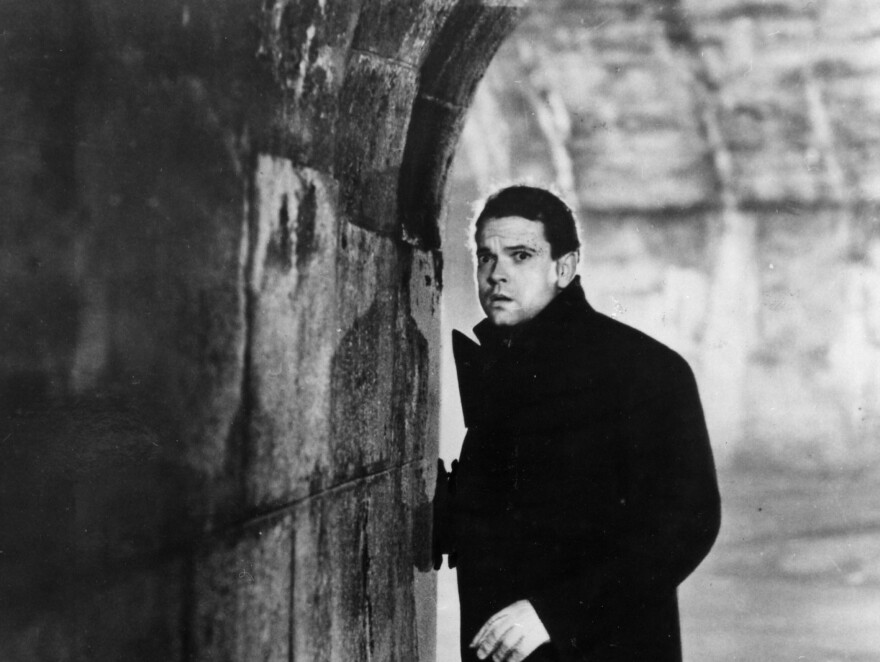Someone asked me once whether it was my opinion as a critic that The Third Man had the most zither-centric score in film history. (This really happened.) I'm certainly not qualified to speak to all films, and there may well be a zither-y score out there somewhere more important or more famous than the all-zither Anton Karas music that accompanies the 1949 film. But it is an important score in general (it led to a zither hit single!), and certainly has to hold an elevated position among zither scores, whether or not it's at the very top.
I tell you this because it makes it all the more interesting that much of the time, when the big action happens, that enormously important score either drops out entirely or stays fairly subtle – rather than doing what it would do in many contemporary dramas and thrillers, which is to get louder and louder until people two theaters over are hearing deep booms while they try to watch a children's cartoon. (If you want to envision me here as an old person shaking my fist, I really won't blame you.)
The Third Man – and pardon the 70-plus-year-old spoilers – concerns Holly Martins (Joseph Cotten), who goes to visit his friend Harry Lime in Vienna after World War II, only to be told that Lime is dead, having been hit by a car. He's also told that Lime was involved in some unsavory business; specifically, he was stealing penicillin, diluting it, and selling it to desperate people on the black market, causing them great injury and sometimes death. Martins starts to investigate, unconvinced it was an accident, and naturally, he gets tangled up with Harry's beautiful lover, Anna (Alida Valli), as well. Because Harry Lime (who, surprise, is not dead) is played by Orson Welles, it's easy to think of The Third Man as a Welles movie, but it was in fact directed by Carol Reed and written by Graham Greene.
The setting in postwar Vienna not only drives the plot (the black market, the tensions among the various sectors of the city, Anna's forged passport and so forth), but it's used to great effect in the several sequences that involve fleeing and hiding – over piles of rubble, in destroyed cars within piles of rubble, sliding and slipping over unpredictable and unstable footing. There are a couple of different nighttime pursuits and a couple of trips into the sewers underneath the city, and particularly in the second – Harry's final run from the consequences of his actions – the music largely disappears.

That means you are left with the sounds of the chase itself: feet over bricks that are slipping, police clambering down noisy stairs, the sound of running along an isolated street, the way echoes change depending on where you are. And then, of course, the roaring of the sewers, the splashing that's deep or shallow, and the rich acoustics of underwater tunnels not meant for travel. Where loud scoring might hand you a mood or a monitor to attach to the tension level, using the sounds of the pursuit stresses the chaotic shifts from place to place and the abrupt arrivals in different settings that mark a truly desperate bid to get away.
We talked a little in our Pop Culture Happy Hour episode about the Watergate and post-Watergate era in film about the spare scoring of a lot of the paranoid thrillers of the early and mid-1970s. The Parallax View, for instance, has a climactic sequence that is, in a choice so clever it almost feels cynical, accompanied only by the sounds of the rehearsal of the marching band that's been brought in for the political event that the sequence reveals as a grotesque parody of patriotism. And then even the band is gone. The aftermath of the main action, which involves a golf cart crashing into a series of banquet tables, just echoes in the cavernous hall. The last eight minutes or so of the 1974 film The Conversation – minutes that really put the "paranoid" in "paranoid thriller" – are also a fascinating study in scoring, in part because when the music cuts out, you hear small mechanical sounds like unscrewing screws and taking apart a phone. Tension with the sparest of scoring is certainly not gone, please don't misunderstand. But it's always interesting to return to it as a counterpoint to bombast – and I say that as a person who often loves bombast.
It's a little bit pointless (an understatement, I know) to compare all this to something like the Battle of New York at the end of The Avengers. What would it mean, after all, to know what it would really sound like if you were in the middle of listening to half the buildings in Manhattan torn apart by mechanical monsters? (Screaming, I think. Mostly, it would all be screaming all the time, which is perhaps why we don't hear it.) The differences between action in Vienna where you're skittering away from the police and action in space where you're zapping alien life forms go well beyond sound and scoring choices. So it's not a matter of lamenting why The Avengers wasn't made like The Third Man, not that I wouldn't love to see that version. It's just about appreciating all the ways that action is made exciting, some of which are surprisingly quiet.
This piece first appeared in NPR's Pop Culture Happy Hour newsletter. Sign up for the newsletter so you don't miss the next one, plus get weekly recommendations about what's making us happy.
Listen to Pop Culture Happy Hour on Apple Podcasts and Spotify.
Copyright 2022 NPR. To see more, visit https://www.npr.org.




